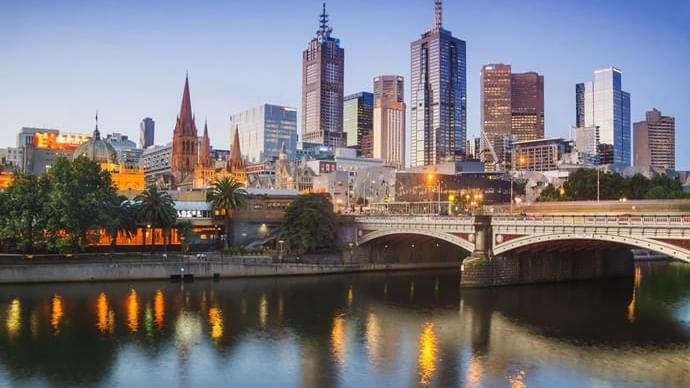The Cost of Living in Melbourne as a Student

Renowned for its culture and arts, Melbourne is one of Australia’s leading university cities. If you’re trying to determine the living cost in Melbourne for a student, we can help you create a realistic budget.
Adding up living expenses like rent, food and travel will help you figure out how much money you’ll need to live your best life as a student in the Victorian capital. Learn more about the cost of living in Melbourne for international students below.
Overview of Expenses
This table offers a general overview of the cost of living in Melbourne. All figures are approximate and may vary depending on your location within the city.
| Weekly rent for an apartment | $430 |
| Monthly public transport ticket | $155 |
| Overseas Student Health Cover Minimum cost is around | $400 |
| Groceries average per household in (VIC) | $257 |
| Meal in a mid-range restaurant | $20 |
| Meal in a high-end restaurant | $50 |
Accommodation

Melbourne has the second-highest average rental prices in Australia after Sydney. According to the Victorian Government’s Department of Health and Human Services, the median weekly cost of rent in the Metro Melbourne region is $430.
However, it’s still possible to find affordable student accommodation in the city, especially if you opt for a studio or shared apartment. Choosing a place where the cost of utilities is included in the rent can help reduce your overall accommodation costs.
Study Costs
Tuition fees at Australian universities are typically calculated per unit, so the cost of studying varies between courses. Study in Australia calculates that international students usually pay between $20,000 and $45,000 for a bachelor’s degree. On top of tuition fees, you’ll need to factor in study materials like textbooks and laptops.
Transport

Melbourne is a well-connected city, with a public transport network made up of buses, trains, and trams. To get around, all you’ll need is a myki card, the city’s reusable public transport ticket (full-time students are eligible for concession prices). Expatistan estimates that using public transport in Melbourne costs around $155 a month.
Food and Groceries

Melbourne has a great dining scene with plenty of budget options. You can get a filling meal for as little as $20, although the city’s high-end restaurants are more expensive, with meals starting at around $50.
Cooking your own meals at home can help keep costs low. Budget Direct found that the average household in Victoria spends $257 on food each week, but as a student you probably won’t need to spend quite that much. In addition to major supermarket chains like Coles, Aldi, and Woolworths, try doing your grocery shopping at local produce markets to save money.
Insurance
Overseas Student Health Cover (OSHC) is one of the main costs you’ll need to consider as an international student. This type of insurance is designed to make sure you have an appropriate level of health cover in case you fall ill or get injured while studying in Australia. It can cost anywhere between a few hundred dollars and well over $1,000 dollars depending on the level of cover you take out and your personal circumstances.
Lifestyle

You’ll want to keep a little money aside for making the most of Melbourne’s exciting lifestyle. From visiting museums and art galleries to shopping for delicious local fare at the Queen Victoria Markets, there are endless things to see and do.
As little as $80 a week will let you experience some of the best attractions Melbourne has to offer, but there are also lots of free attractions to enjoy if you’re on a tight budget. You could see the sights of Federation Square, walk along the Yarra River, or soak up the natural scenery in the Royal Botanic Gardens.
Browse all our student accommodation locations in Melbourne today.
If you are looking for part-time work to help pay your expenses, check out our article on the top 4 flexible jobs that are perfect for uni students.


